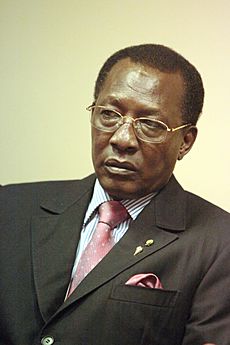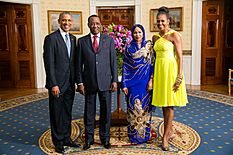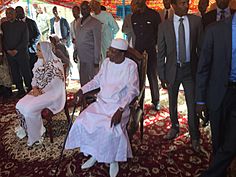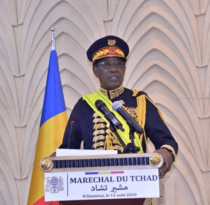Idriss Déby facts for kids
Quick facts for kids
Idriss Déby
|
|
|---|---|
|
إدريس ديبي
|
|
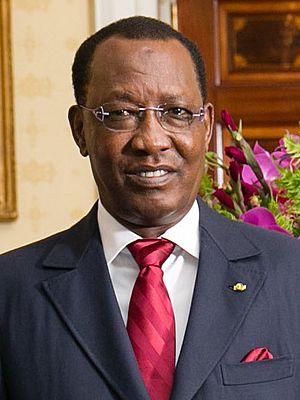
Déby in 2014
|
|
| 6th President of Chad | |
| In office 2 December 1990 – 20 April 2021 |
|
| Prime Minister |
See list
|
| Vice President | Bada Abbas Maldoum (1990–1991) |
| Preceded by | Hissène Habré |
| Succeeded by | Mahamat Déby (transitional) |
| 14th Chairperson of the African Union | |
| In office 30 January 2016 – 30 January 2017 |
|
| Preceded by | Robert Mugabe |
| Succeeded by | Alpha Condé |
| Personal details | |
| Born | 18 June 1952 Fada, French Equatorial Africa (now Chad) |
| Died | 20 April 2021 (aged 68) Tibesti Region, Chad |
| Cause of death | Killed in action (gunshot wounds) |
| Resting place | Amdjarass |
| Political party | Patriotic Salvation Movement |
| Spouses |
Zina Wazouna Ahmed Idriss
(divorced)Hadja Halimé
(divorced)Hinda Déby Itno
(m. 2005; Amani Musa Hilal
(m. 2012; |
| Children |
|
| Signature | |
| Military service | |
| Allegiance | |
| Branch/service | |
| Years of service | 1976–2021 |
| Rank | |
| Battles/wars |
|
Idriss Déby Itno (18 June 1952 – 20 April 2021) was a Chadian politician and military leader. He served as the president of Chad for over 30 years, from 1990 until his death in 2021.
Déby was a member of the Zaghawa ethnic group. He was a high-ranking commander in Chad's military during the 1980s. He played key roles in the Toyota War, which helped Chad win against Libya. Later, he was forced to leave the country.
In December 1990, Déby led a successful takeover against the then-president, Hissène Habré. He then introduced a system with multiple political parties. However, his own party, the Patriotic Salvation Movement, remained the most powerful. Déby won many presidential elections during his time in office.
Chad discovered oil in the early 2000s. Déby made oil production the main focus of the country's economy. He faced several rebellions and attempts to remove him from power. In April 2021, Déby was injured while leading troops against rebels. He died the next day.
Contents
Early Life and Military Career
Idriss Déby was born on 18 June 1952, in a village called Berdoba in northern Chad. His father was a herdsman from the Zaghawa community. Déby went to school in different parts of Chad, including Fada and Abéché. He also earned a bachelor's degree in science.
After school, he joined the Officers' School in N'Djamena, Chad's capital. He then went to France for military training. He returned to Chad in 1976 as a professional pilot.
Déby became a strong supporter of Hissène Habré, a powerful Chadian leader. When Habré became president in 1982, Déby was made commander-in-chief of the army.
Key Military Actions
- In 1984, Déby gained fame by defeating pro-Libyan forces in eastern Chad.
- He went to Paris for further military training in 1985.
- In 1987, he led Chadian forces against Libya in the "Toyota War". His tactics caused heavy losses for the enemy.
- He even led a raid into Libyan territory during this war.
A disagreement grew between Habré and Déby in 1989. Habré became suspicious of Déby and others, accusing them of planning a coup d'état (a sudden takeover of the government). Déby fled to Darfur and then to Libya. Other officials accused by Habré were arrested and killed.
In 1989, Déby moved to Sudan. There, he formed a rebel group called the Patriotic Salvation Movement. This group was supported by Libya and Sudan. On 2 December 1990, Déby's troops marched into N'Djamena without resistance, successfully removing Habré from power.
President of Chad
Idriss Déby became president of Chad in 1991. He was re-elected every five years until his death in 2021, serving for 30 years.
First Years in Power (1990s)
- In February 1991, a new plan for Chad's government was approved, with Déby as president.
- For the next two years, Déby faced several attempts to overthrow him.
- To calm the country, Chad allowed political parties in 1993. A large meeting was held to discuss creating a democracy.
- However, fighting continued with various rebel groups.
- In the mid-1990s, Déby worked to restore government services. He also made agreements with the World Bank to improve Chad's economy.
- A new constitution was approved in 1996. Déby was then elected president in July 1996, winning 69% of the vote.
Challenges and Re-elections (2000s)
- Déby was re-elected in May 2001 with 63.17% of the vote.
- A civil war between different groups started in 2005.
- In March 2006, an attempt to overthrow Déby was stopped.
- Fighting with rebels reached N'Djamena in April 2006. Government forces kept control of the capital.
- Déby accused Sudan of supporting the rebels. He was sworn in for another term on 8 August 2006.
- In 2005, a public vote removed the two-term limit for presidents. This allowed Déby to run again in 2006.
- He won the 2006 election with 64.67% of the vote. Many opposition groups boycotted this election.
Oil Discovery and Economy
- In 2000, Déby's government began building Chad's first oil pipeline. This project was praised by the World Bank.
- Oil production started in 2003. The project aimed to use oil money to help poor people and improve the environment.
- Chad received only a small share of the oil profits at first.
- In 2006, Déby demanded that Chad get a 60% share of the oil output. He said foreign companies were not paying enough taxes.
- Chad passed a law that required most oil money to be used for health, education, and infrastructure.
- The World Bank had previously frozen an oil account. This was due to concerns about how Chad was spending its oil money. Déby argued that Chad did not receive enough money to fight poverty effectively.
Regional Role and Anti-Corruption (2010s)
- On 25 April 2011, Déby was re-elected for his fourth term with 88.7% of the vote.
- Chad's location in West Africa meant Déby often sent troops or helped solve regional problems. This included conflicts in Darfur, the Central African Republic (CAR), and Mali.
- Chad also played a role in fighting the terrorist group Boko Haram.
- In 2012, Déby sent 400 troops to fight rebels in the CAR.
- In January 2013, Chad sent 2000 troops to Mali to fight Islamist groups.
- In 2012, Déby started an anti-corruption campaign called "Operation Cobra." It reportedly recovered about $50 million.
- In January 2016, Déby became the chairman of the African Union for one year. He said that conflicts in Africa must end.
- He focused on speeding up the fight against Boko Haram.
- At a climate conference in Paris in 2015, Déby spoke about Lake Chad. He asked for international help to protect its ecosystem.
- In February 2016, Déby was nominated to run for president again. He promised to bring back term limits for presidents.
- In January 2019, Chad and Israel announced they would restart diplomatic relations.
Final Term and Death (2020s)
- In 2020, Déby signed a law that ended the death penalty in Chad.
- In February 2021, Déby announced Chad would send 1,200 soldiers to fight al-Qaeda linked groups in the Sahel region.
- In the 2021 presidential election, Déby won his sixth term as president. The results were announced on 19 April, showing he won 79.32% of the votes.
- Many political opponents had withdrawn from the election. They called for a boycott due to concerns about security forces' actions during protests.
- Instead of giving a victory speech, Déby went to visit Chadian soldiers. They were fighting rebels from the Front for Change and Concord in Chad (FACT) in northern Chad.
- He was severely wounded on 18 April while leading troops. He died on 20 April 2021.
Personal Life
Déby added "Itno" to his last name in January 2006. He was a Muslim.
Déby had four wives: Zina Wazouna Ahmed Idriss, Hadja Halimé, Hinda Déby Itno, and Amani Musa Hila. He had at least twelve children.
In September 2005, Déby married Hinda, who was known for her beauty. This marriage was seen as a way for Déby to gain more support from different groups. Hinda Déby was considered the "First Lady of Chad." She held important positions in the government.
On 21 January 2012, Déby married his most recent wife, Amani Musa Hila. She was from Sudan and a member of Déby's Zaghawa tribe. This marriage was seen as a way to improve relations between Chad and Sudan.
In July 2007, Déby's son, Brahim, was found dead in Paris at age 27. An investigation was launched. Four men were later convicted in connection with his death.
Death in Battle
Déby was killed in April 2021 while leading his forces. He was fighting against rebels from the Front for Change and Concord in Chad (FACT). An army spokesperson stated that Déby died from gunshot wounds on 20 April 2021. He was 68 years old.
After his death, the Chadian Parliament and Government were dissolved. A new group called the Transitional Military Council was formed. Déby's son, Mahamat Déby Itno, became its chairman. The country's constitution was also suspended.
Chad declared a fourteen-day period of national mourning. Flags were flown at half-mast. Public institutions and schools were closed for several days. Other countries, like Mali and South Sudan, also declared days of mourning.
Déby's funeral took place on 23 April 2021. Thousands of people gathered in N'Djamena to honor him. Leaders from France and several African countries attended the funeral.
See also
 In Spanish: Idriss Déby para niños
In Spanish: Idriss Déby para niños
- List of heads of state of Chad
- Human rights in Chad
Images for kids
 | Emma Amos |
 | Edward Mitchell Bannister |
 | Larry D. Alexander |
 | Ernie Barnes |


